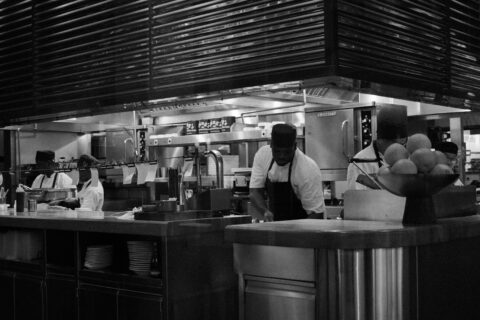In the bustling sphere of the hospitality industry, food safety holds paramount importance. Ensuring a meal is not only delicious but also safe, represents the industry's commitment to its customers' well-being and satisfaction. Yet despite its critical role, food safety is often overshadowed by other operational aspects.
For instance, in a bid to maximise profit margins, some establishments may prioritise cost-cutting measures, such as opting for cheaper food suppliers who perhaps don't adhere strictly to hygiene standards.
Similarly, in the quest for efficiency, there may be pressure on kitchen staff to prepare meals in the quickest possible time, which may inadvertently lead to skimping on important food safety procedures like proper cooking temperatures or cross-contamination prevention.
This focus on cost-efficiency and speed can potentially undermine the critical role of food safety, putting customers at risk.
We’ve compiled a list of our top reasons why the hospitality industry must prioritise food safety solutions, underlining their significance in enhancing customer experience, reputation management, and regulatory compliance.
- Food Safety Builds Consumer Trust
When it comes to the hospitality industry, building and maintaining consumer trust is essential. Robust food safety solutions play a crucial role in this process. Consumers today are more educated and aware than ever before about the importance of food safety. They want to be confident that the food they consume at hotels or restaurants is not just tasty, but also prepared and handled following the highest standards of hygiene.
When an establishment can demonstrate a commitment to food safety, it reassures customers and fosters a sense of trust. This trust, in turn, translates into brand loyalty, repeat business, and positive word-of-mouth publicity.
- Consumer Demand for Traceability & Transparency
Consumers demand transparency, and food safety solutions enable the hospitality industry to provide clear and reliable traceability. Customers are increasingly interested in knowing the origins of their food.
QR codes on menus can give customers immediate access to this information, allowing them to make informed decisions about their food choices and offering them reassurance about the food's safety and quality. Such measures not only boost customer confidence but also enhance the establishment's reputation for accountability and transparency.
Such traceability is not just about knowing the source but also understanding the journey of the food, including how it was produced, processed, and prepared. By implementing food safety solutions that offer traceability, hospitality businesses can provide the transparency that their customers seek.
- Protect the Bottom Line
Implementing food safety solutions can also significantly impact a hospitality business's bottom line. The financial repercussions of a food safety incident, such as a foodborne illness outbreak, can be substantial. These range from the immediate costs of product recalls and lawsuits to the long-term consequences of damage to the brand's reputation.
By prioritising food safety, businesses can mitigate these risks.
Furthermore, efficient food safety systems can contribute to cost savings by reducing waste, optimising supply chain efficiency, and increasing staff productivity. Food safety solutions serve as an investment that can secure future profitability and sustainability for hospitality businesses.
Factors Affecting Food Safety in the Hospitality Industry
-
Cross-contamination: This is a significant cause for concern in the food industry where harmful bacteria from one food item can easily spread to another if proper safety protocols are not followed. A common example of cross-contamination could occur when a cutting board used for preparing raw chicken isn't properly cleaned before being used to chop vegetables for a salad. The bacteria from the raw chicken can transfer to the vegetables, potentially leading to foodborne illnesses if the salad is served without further cooking. This example highlights the importance of thorough cleaning and separate preparation areas for different types of food to prevent cross-contamination.
-
Inadequate training: It is a requirement for all staff who handle food in any capacity to have received current food safety training by a recognised training provider. Not only does this have the potential to lead to serious food safety breaches, your venue will also be in breach of not meeting the new requirements of standard 3.2.2A Not only must all of your venue staff be trained in food safety (who handle food), your venue/outlet must have a Food Safety Supervisor on site at all times of operation, or otherwise reasonably available.
-
Poor personal hygiene of staff: Personal hygiene of the staff members working in a kitchen plays a crucial role in maintaining food safety. Although we’ve all had to navigate an awkward personal hygiene interaction with an employee, not addressing this issue could lead to contamination.
-
Improper storage of food: Incorrect storage temperatures or conditions can cause food to spoil or foster bacterial growth, posing a risk to food safety.
-
Supply chain issues: If any point in the food supply chain—from farm to table—does not adhere to food safety practices, it can compromise the safety of the food served.. This is why it is essential all parties involved in the food production and preparation process adhere to strict food safety procedures.
-
Lack of regular audits or inspections: Periodic audits and inspections are essential to ensure that food safety rules are being consistently followed. Lack of such checks can lead to deterioration in safety standards.
Cost-Effective Solutions for Ensuring Food Safety
-
Invest in Training: Not only is Food Safety a requirement for hospitality or retail businesses serving food, providing comprehensive training for staff on food safety standards and procedures is a cost-effective solution. This ensures that every team member understands their role in maintaining food safety and is equipped to handle situations correctly. It is cost-effective because it reduces the risk of costly incidents such as foodborne illness outbreaks and the potential ensuing legal action. According to a study by the World Health Organisation (WHO), the annual cost of foodborne diseases in terms of lost productivity and medical expenses can reach billions of dollars. A one-time investment in comprehensive training can help prevent such costly incidents. Furthermore, well-trained staff are generally more efficient and make fewer mistakes, reducing waste and saving resources in the long term. Moreover, venues with a reputation for stringent food safety standards can attract more customers, thus increasing revenues. Thus, investing in staff training can yield substantial returns in the long run.
-
Regular Audits and Inspections: Implementing regular audits and inspections can help identify potential issues before they become serious problems. This proactive approach not only ensures compliance with food safety regulations but also helps in maintaining consistency in food quality.
-
Utilise Technology: Incorporating technology can streamline food safety procedures, making them more efficient and reliable. For example, digital temperature monitors can ensure proper food storage conditions, while traceability software can provide complete visibility into the supply chain.
-
Implement a HACCP Plan: A Hazard Analysis Critical Control Point (HACCP) plan is a systematic approach to identifying and controlling potential hazards throughout the food production process. Developing and adhering to a HACCP plan can enhance food safety and prevent contamination.
-
Supplier Verification: Establishing a robust supplier verification process can ensure that all ingredients used originate from safe, reliable sources. This can significantly lower the risk of introducing foodborne illnesses or contaminants into your establishment.
-
Encourage a Culture of Safety: Foster a culture where everyone from the top down understands the importance of maintaining food safety standards. When food safety becomes an integral part of the company culture, it is more likely to be taken seriously and adhered to by all staff members.
Technology’s Role in Improving Food Safety
-
Automated Monitoring: Technology can automate routine checks and monitoring, reducing human errors and increasing efficiency. For instance, sensors and Internet of Things (IoT) devices can monitor temperature in storage areas, alerting staff when parameters exceed safe limits.
-
Traceability: Advanced software solutions can track food products through every step of the supply chain, providing complete transparency and helping to quickly identify and address any issues.
-
Training Tools: Technology can offer innovative training tools such as virtual reality (VR) or e-learning platforms, making food safety training more engaging and effective.
-
Data Analysis: Technologies like AI and machine learning can analyse large volumes of data to predict potential food safety risks, enabling businesses to implement preventive measures.
-
Digital Documentation: Digital platforms can streamline the documentation process, ensuring all food safety records are easily accessible and up to date, aiding in regulatory compliance.




